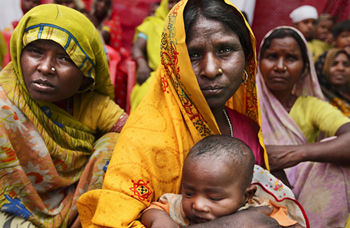Patna, Jan 15: Family members of the Dalits who were killed in 1999 in Bihar's Arwal district, allegedly by the outlawed, upper -caste militia Ranvir Sena men, are disheartened and devastated over the release of all the accused.
Etwaria Devi, in her late 50s, lost her husband Ganga Paswan and another relative Nanhu
Paswan in the massacre of 22 Dalits Jan 25, 1999, at Shankar Bigha village. A court Tuesday acquitted 24 people of the massacre, citing lack of evidence. The surviving family members are not only upset and sad over the verdict, they are also angry and feel there is nobody to do them justice.
"There is no one to do justice to the poor like us. We have only pain and misery in our life," said Etwaria Devi in a choked voice.
Another resident of the village, Rajmani Devi, whose husband, father-in-law, mother-in-law and sister-in-law were killed in the massacre, said: "Who cares for justice to the poor? We have lost hope. It is bad news for us that all accused were acquitted."
Both of them said they have no hope left as money and muscle power of the powerful feudal forces were responsible for the gruesome incident.
Lakshman Ram, a village elderly, said most of the villagers were unhappy and angry over the court acquittal.
"The villagers are not ready to accept that the accused have been let off...," said villager Ram, who also had lost a relative.
He also blamed the police and the state government for the acquittals. "The police did not file a strong chargesheet with solid evidence against them...," he claimed.
All the Dalit victims were landless agricultural workers.
Shankar Bigha is located near Lakshmanpur-Bathe where the Ranvir Sena killed 61 agricultural workers belonging to backward communities in December 1997.
This is the fifth major acquittal in a massacre case in the state.
In 2012, the high court acquitted 23 accused of Bathani Tola massacre of 1996 in which 21 Dalits were killed.
On Oct 9, 2013, the Patna High Court acquitted 26 accused of the Lakshmanpur-Bathe massacre of 1997.
On July 3, 2013, the high court acquitted nine of the 10 accused in the Miyanpur massacre case of 2000 in which the Ranvir Sena men allegedly killed 32 people in Aurangabad.
On March 1, 2013, the high court acquitted 11 convicted accused in the Nagari Bazaar massacre case in which 10 CPI-ML supporters, mostly Dalits, were killed in Bhojpur district in 1998.






Comments
Add new comment